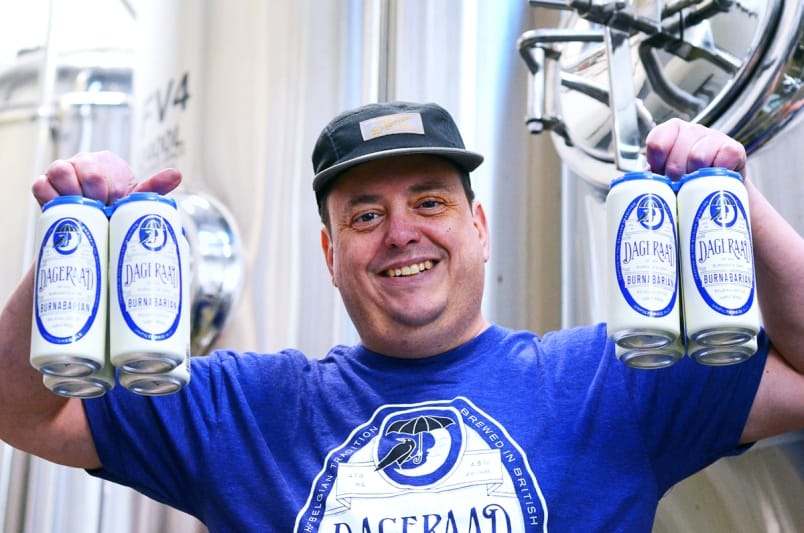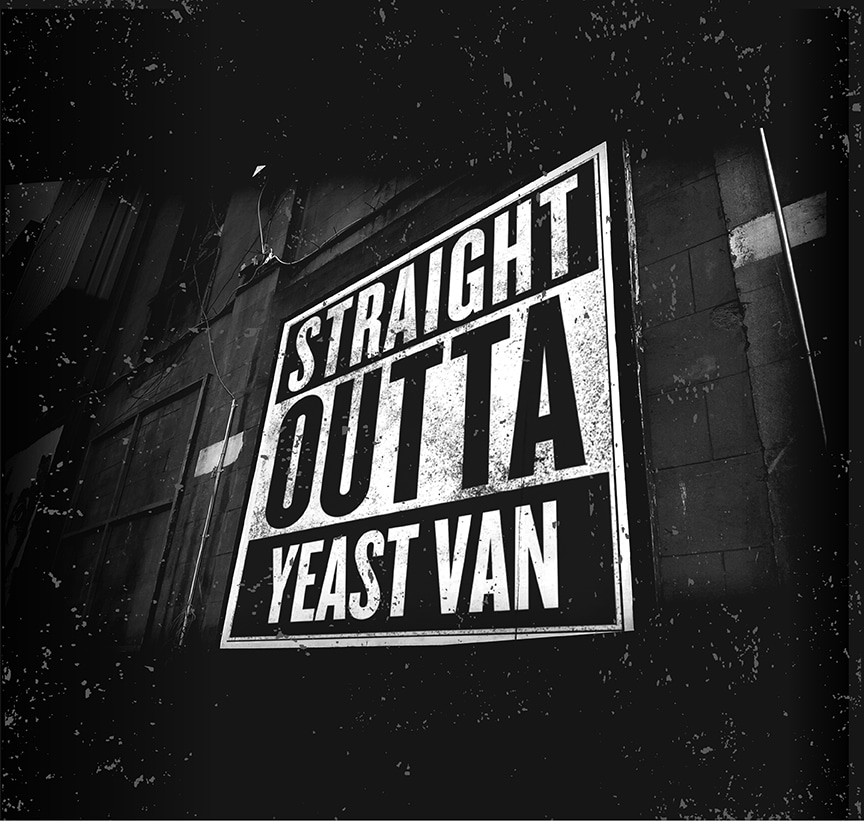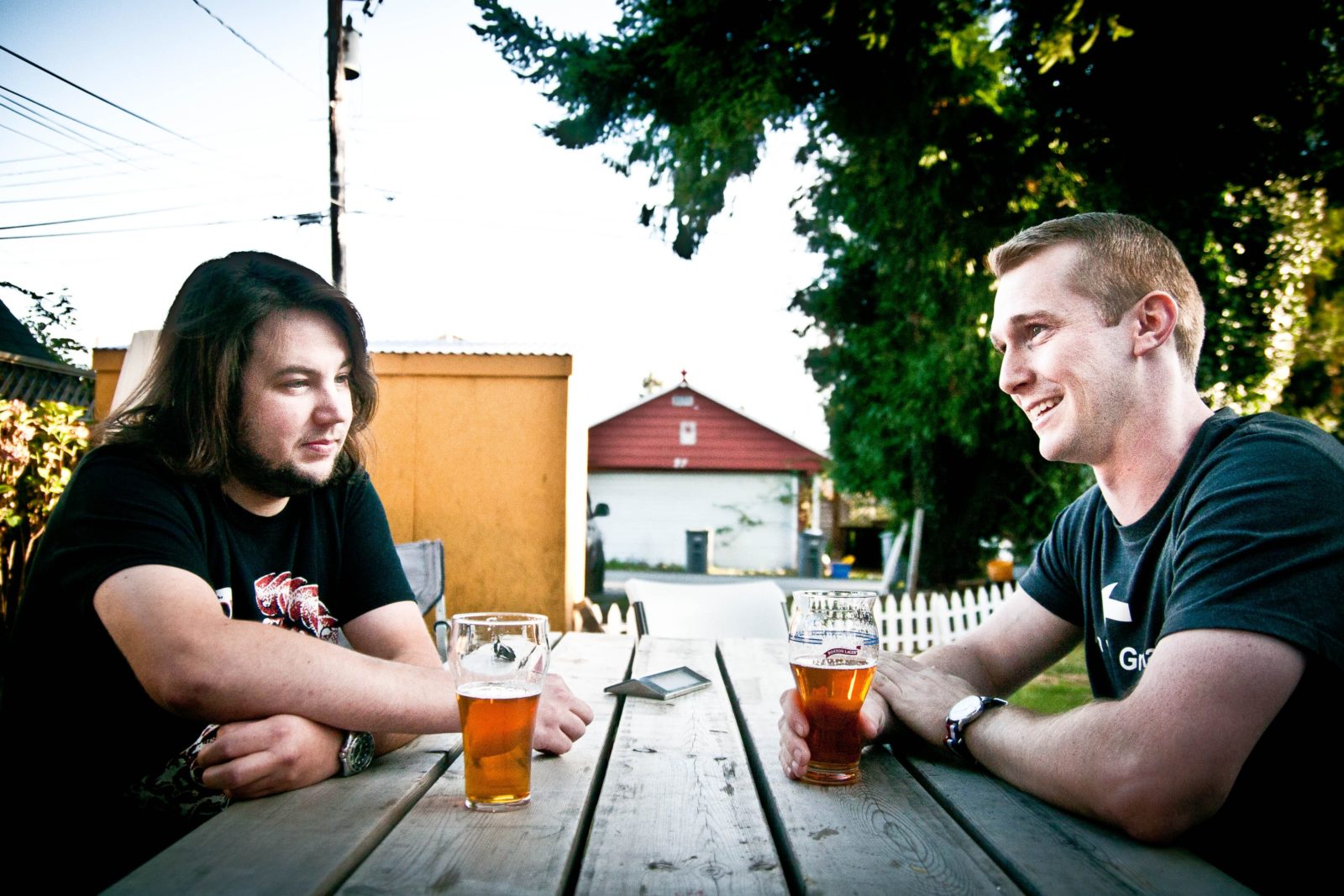
Burnaby’s Dageraad Brewing may have marked its fourth anniversary earlier this month, but the big celebration came Saturday night after it was named Brewery of the Year at the Canadian Brewing Awards in Halifax. For owner/brewer Ben Coli, the award was a welcome recognition of Dageraad’s uncompromising approach after four years of ups and downs (but mainly ups).
I caught up with Coli to speak with him about the importance of the award and what it will mean for the brewery moving forward.
The Growler: First of all, congratulations! Are you home from Halifax yet?
Ben Coli: I never went, I stayed at home. [Brewery manager Mitchell Warner] went instead.
Growler: Oh wow, so how’d you find out about the win? How’d that happen?
Coli: I was at home with my kids. My parents were visiting so I was watching it on the live stream. My kids were getting fussy and pestering me—they’re 20 months old, so like a year and a half. So my two kids are grabbing at me trying to pull me away and I was riveted to this award show. But yeah, it was incredible. I had my family around me, except for my wife, who was out of town, but my brother and my parents were with me and they were more excited than I was, I think.
Growler: Did you do anything to celebrate?
Coli: Yeah, not really. You know, I’m a dad. Actually, I went over to [Brassneck brewer] Conrad Gmoser’s birthday party after—it was his 50th birthday that day—so I went over and there were a few other brewers there. They all teased me before they congratulated me. Iain Hill [of Strange Fellows Brewing] locked eyes with me and said, “I hope you know this doesn’t mean you’re the best brewer in Canada, right?” It’s a friendly rivalry. But, yeah, it was mostly teasing.
Growler: So how does it feel to get that kind of recognition, on this scale?
Coli: It’s incredible, you know. I mean, I think of the brewery, and I feel like we’re overlooked a little bit because we’re not brewing the super fashionable beers of the moment. We don’t really follow trends, we don’t brew hazy IPAs—we don’t really brew IPAs at all. We’re doing this this other thing, brewing the beers that I fell in love with and it takes a little bit more learning for people to get to where we are, to understand what we’re doing. Other breweries are rocking and rolling and selling way the hell more beer than we do, so it’s incredible to get this kind of recognition on a national scale. It feels amazing to get recognised for being good at what we do, for sticking to our guns. I mean, when we opened our doors four years ago, people told me I was crazy for not brewing an IPA, and I kind of was. And we had a rocky start. It wasn’t necessarily easy to convince people that we could do what we were trying to do, and then four years later to be the brewery of the year, it’s incredible to me.
Growler: It’s a huge achievement and it’s a very marketable award. What does this mean for the future of Dageraad?
Coli: I have no idea. What I really want to be able to do, is do more of what I love, which is make Belgian-style beers that are bottle conditioned. We recently started canning beer, which is fine and great and it’s a really convenient package, but I really hope to convince people more of the merits of bottle conditioning. It adds a whole layer of complexity to the beer and it makes the beer taste way better, and also it really improves our shelf life. The active fermentation in the bottle helps eliminate the oxygen and it just makes the beer last for a really long time, which is part of the reason why we do so well in awards. They shouldn’t be “brewing” awards, they should be “brewing and packaging” awards. The market is going heavily towards cans right now, and for several good reasons, but for our particular beer, bottles really make the most sense and I want to raise awareness about that, so that we can keep doing it even while even while other breweries are going towards cans.
Growler: Is the win going to change anything for the brewery?
Coli: I don’t know, it’s only been two days. I just hope it’s going to get a little bit easier to sell the beer. I mean, we’re going to keep doing what we’re doing. We’re not going to change our growth plan. We’ve always had a number in mind about how big we want to get, which is not that much bigger than we are right now. And we’re just going to stop right there and just focus on our craft. We’re going to keep brewing this relatively small volume of beer and keep making it as well as we can. If the business is profitable enough that we can pay everyone decently and all live decent lifestyles, then I don’t see any reason to keep growing, just for the sake of growth.
Growler: So you’re not going to pull a Central City and try to take over the world?
Coli: Exactly. Or our buddies at Four Winds, they’re building a new brewery and since they won their Canadian Brewing Award [for Brewery of the Year in 2015], it’s just been up, up, up for them. They’ve been riding that, and they are doing so well. But we’re not going to do that. Partly it’s the style of beer we brew. I want to keep making these beers, and I don’t think there’s a market for 50,000 hectolitres a year for these beers. If we wanted to do those kinds of numbers we’d have to start doing a Beer League Lager to make up that kind of volume, and I have no interest in any of that. I want to be able to have a reasonably profitable small business that makes the beer that I love.
Growler: How did you get into beer? Where did the love for Belgian beers come from?
Coli: When I grew up in Calgary—and I’m 41 now, so this is a while ago—craft beer didn’t exist as it does today. But my first beers were Big Rock beers, I didn’t start out on the total Molson Canadian train like a lot of people did. I was always interested in other beers, other than lager, although I drank my share of crap lager, too. But I remember the first time I tried La Fin Du Monde by Unibroue, that was big. And when I was in university, I took a trip that included a quick stop in Belgium, and [my love for Belgian beers] just slowly grew from that. A dozen or so years ago I was backpacking around Southeast Asia and I met a couple of Belgians out there. I really got along well with them and visited them in Belgium a couple of times and hung out and just absolutely fell in love. I was blown away by the beer there; it’s unlike anywhere else in the world. The beer culture there, as well, the way you can just go a shitty café at the train station and they’ll have these amazing bottle conditioned beers. They’re just available, they’re just everywhere. Any old mom-and-pop shop has got these things on the shelf.
Growler: So you wanted to bring a little piece of that home…
Coli: That was the idea. I mean with the imports, you couldn’t always find them, often they were expensive, and not always fresh—through no fault of the brewery, they’d sit on a shelf and often not get sold particularly quickly, you didn’t know whether you’re going to get a fresh bottle or not. So I thought we should have [Belgian-style beers] made here, made locally at reasonable prices, with local ingredients and a reasonable assurance that the beer was going to be in great shape when you got it.
Growler: Tell me about the beers you won gold for: Entropy No. 6, Antwerpen and Burnabarian.
Coli: Well, [Entropy No. 6] we’ll never do again. We only did one barrel of that, and it’s gone. We set aside six bottles just for competitions out of the 21 cases we packaged because we thought it was so good.
Growler: Burnabarian is an interesting one, in terms of your line up, because it’s the only canned beer that you do, and it’s really the most mass marketable one. And unlike a lot of your beers, it’s an absolute crusher.
Coli: And it’s a gold medal winner! It’s actually won a medal three years in a row at the Canadian Brewing Awards; a gold two years ago, a silver last year and a gold again this year. I feel like it is a totally crushable, mass marketable beer, that isn’t compromising. I don’t feel like we’re selling out to make that beer, it’s still definitely one of our beers. It still definitely has the layers and complexity of a proper Belgian beer.
Growler: Tell me about Antwerpen.
Coli: Antwerpen is a tripel, our first tripel. There’s a whole category of beer out there I like to call “Belgian yellow beer.” There’s golden strongs, blondes, saisons and tripels and the lines between these styles are blurry. They all definitely lean one way or another, but the four styles are kind of in a family together. And people would ask us, “when are you going to brew a tripel?” but our Blonde is fairly close [to a tripel]. So when we finally got around to brewing a tripel, it was important to me that it was different enough from Blonde, and I think the beer completely is. Rather than being really fruity—it’s a little bit fruity—it’s also hoppy and mostly floral and it’s just it’s a beast of a beer. I mean it’s 8.5% alcohol and you wouldn’t notice that while you’re drinking it. It’s a mugger in an alley, it jumps out at you.
- Dageraad Brewing is located at 3191 Thunderbird Crescent in Burnaby, near Production Way-University SkyTrain station. Its tasting room is open seven days a week and its beers are available at better liquor stores across the province. For more information, visit DageraadBrewing.com.




